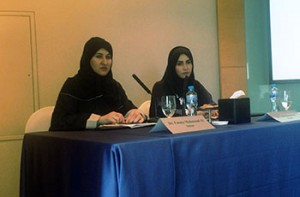Hajj brings together a huge number of pilgrims from different countries, which can pose a major health concern due to importation or exportation of infectious diseases, and spread between attendees and to the local population.
- Hajj is the largest mass gathering in the world, drawing around two to three million Muslims from more than 180 countries worldwide.
- Pilgrims should undertake precautionary measures against pneumonia, meningitis, respiratory tract infections, tuberculosis, viral infections, community-acquired pneumonia, blood borne diseases and food poisoning which can lead to hospitalization and further fatalities.
- A retrospective analysis in UAE examined rates of community and hospital-acquired pneumonia revealed the average age of patients as 58 years, and the most common co-morbidities were diabetes mellitus (21%), malignancy (20%) and chronic obstructive pulmonary disease (COPD) (19%).
 Dubai, United Arab Emirates, 19 August, 2015: Citing the dangers of pneumococcal disease and the need for timely prevention measures for Hajj pilgrims, leading health experts in UAE came together to raise awareness and address media on the ‘control of infectious diseases during Hajj, burden of pneumococcal disease and role of early vaccination’.
Dubai, United Arab Emirates, 19 August, 2015: Citing the dangers of pneumococcal disease and the need for timely prevention measures for Hajj pilgrims, leading health experts in UAE came together to raise awareness and address media on the ‘control of infectious diseases during Hajj, burden of pneumococcal disease and role of early vaccination’.
Pneumococcal disease consists of infectious diseases which describe a group of serious illnesses caused by the bacterium Streptococcus pneumoniae (S. pneumoniae), including pneumonia, meningitis and sepsis.3 To reduce the health burden associated with this disease for pilgrims and prevent these infections from spreading, experts in UAE have advised early vaccination for Hajj travelers as a necessary measure.
Pneumococcal disease can be a serious threat, with individuals who carry S. pneumoniae in their nasal passages, potentially exposing others to the risk of developing the disease through close contact via respiratory droplets that are sneezed, coughed, or exhaled containing S. pneumoniae bacteria.3 Age is a primary risk factor for pneumococcal disease, and as the world’s population ages, the number of people at risk for pneumococcal infection grows.4,5 The risk groups are elderly adults over the age of 65, adults with comorbidities like type 2 diabetes mellitus, hematological malignancy, organ and bone marrow transplantation or chronic kidney or lung diseases and pilgrims undertaking the Hajj.
“There is an increasing need to create awareness on infectious diseases that travelers may be exposed to while undertaking Hajj. Pilgrims need to proactively undertake preventive measures like vaccination and maintaining proper hygiene to reduce the risk of contracting these serious diseases. Vaccination against meningitis is important and must be taken at least ten days before traveling.” said Ms. Laila Hussain Al Jasmi, Head Immunization Section, Preventive Medicine Department, Health Centers and Clinics Sector, Ministry of Health, UAE
The Ministry of Health in the Kingdom of Saudi Arabia and local health authorities in UAE have laid down health recommendations for travelers in addition to setting up vaccination facilities in each of the countries.6,7,8 However, low awareness on the diseases still remains a challenge.
“Ageing is a widely recognized risk factor in pneumococcal disease due to natural weakening of the immune system and susceptibility to infection. The preventive potential of adult pneumococcal vaccination is under-recognized. It is essential for people to understand its benefits to ensure an overall increase in the awareness about the burden of pneumococcal disease in the region.” added Dr. Fatma Al-Attar, Consultant and Head of International Health Regulation Office, Ministry of Health, UAE
Center for Disease Control and Prevention (CDC) recommends adult vaccination to help prevent pneumococcal disease, among other infectious diseases.9 According to WHO’s facts on immunization, it is one of the most successful and cost-effective of public health interventions for pneumococcal disease, preventing between 2 million and 3 million deaths every year in people of all ages.
References:
- Memish ZA. Zumla A. Alhakeem RF. et all. Lancet mass gatherings medicine 1. Hajj: infectious disease surveillance and control. 2014; Series 1. Published online May 21, 2014.
- Feldman C. Abdulkarim E. Alattar F. et all. Pneumococcal disease in the Arabian Gulf: Recognizing the challenge and moving toward a solution. Journal of Infection and Public Health. 2013; June 2013. 401—409.
- Pneumococcal Disease. Centers for Disease Control and Prevention (CDC). CDC Pink Book. 2011; 16:233-248
- Ludwig E. Bonanni P. Rohde G. Sayiner A. Torres A. The remaining challenges of pneumococcal disease in adults. European Respiratory Review. 2012; Vol. 21 Number 123
- Global health and Aging. National Institute on Aging. Updated March 21, 2014.
- Umrah Travelers Urged to Get Early Vaccination. Announcement by HAAD. 2015; Available at http://www.haad.ae/haad/tabid/58/ctl/Details/Mid/417/ItemID/435/Default.aspx
- Health Regulations for Travelers to Saudi Arabia for Umrah& Pilgrimage (Hajj)-1435 (2014). Updated in 2014. http://www.moh.gov.sa/en/Hajj/Pages/HealthRegulations.aspx
- Dubai Health Authority- Health articles on Hajj. Available at https://www.dha.gov.ae/EN/HealthEducation/Articles/pages/hajj.aspx
- Adults: Protect Yourself with Pneumococcal Vaccines. Centers for Disease Control and Prevention. Page updated: February 2, 2015
- 10 facts on immunization. World Health Organisation. April 2012; Available at: http://www.who.int/features/factfiles/immunization/en/

